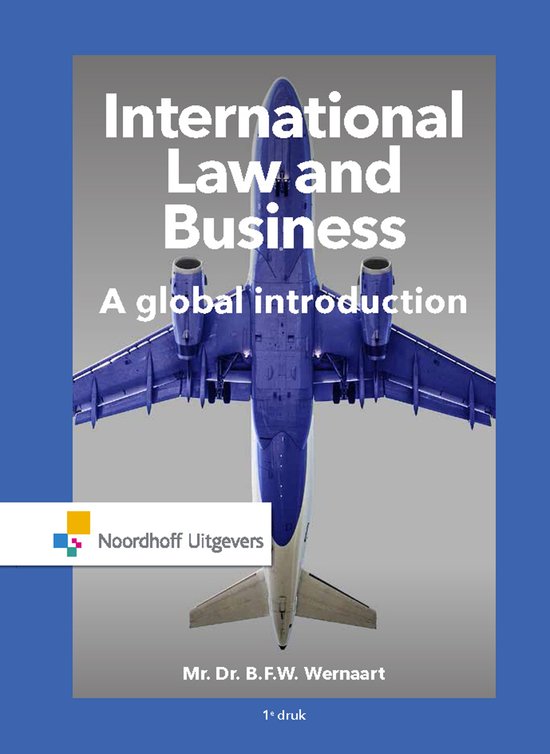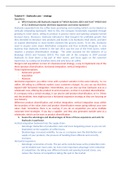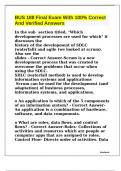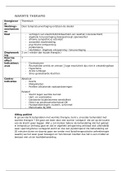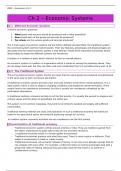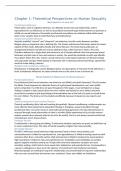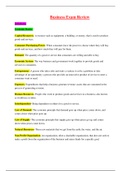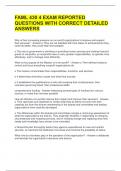Business Law and Ethics Test Exam – Answer model
Answer 1 (3 points)
No. The judges will find the law primarily in court rulings (1), but law can also be found in
legislation (1). Codified standards and legislation are mostly the recognition of these
permanent precedents in case law (1).
Answer 2 (3 points)
Substantive law, because it gives rules on the content of just behavior (1). Just behaviour
would be, that a person can only marry and be married to one person at the same time (1).
Marriage law is private law (family law) because it regulates a relationship between private
citizens (1).
Answer 3 (3 points)
Stare decisis (1) and this principle forbids a judge to contradict previous cases (1) because
case law should be a consistent source of law (1). Also correct but not adding up in credit
points: because of legal certainty (1): one should be able to predict the outcome of a court
ruling (2).
Answer 4 (3 points)
A monistic and a dualistic system (1): in a monistic system international law is automatically
part of the national legal order (1), in a dualistic system it is assumed that a signed and
ratified treaty requires transformation into a national legal order first, before it forms part of
the national legal order (1).
Answer 5 (3 points)
Private law (1), for they regulate the relation between citizens (1), even in the case that a
government commits a tort, because tort law is essentially a private law instrument (1).
Answer 6 (3 points)
The country falls in the family of religious law systems (1). Since the religious writings are
leading in this country, the religious writings will prevail (1) over any contradictory law (1).
Answer 7 (2 points)
Socialist law – legal family (1)
Also correct but not adding up in credit points:
Common law – legal family (1) (the UK because the Government has a place in Parliament)
Civil law – legal family (1) (e.g. the Netherlands, where the government is formally part of
the legislature in the sense of the separation of powers)
The phrase signifies that the separation of powers between the administration and the
legislature is not strictly applied (1).
Answer 8 (3 points)
The principle of mutual recognition (3).
Business Law and Ethics – Test Exam – Answer model pg. 1
Answer 1 (3 points)
No. The judges will find the law primarily in court rulings (1), but law can also be found in
legislation (1). Codified standards and legislation are mostly the recognition of these
permanent precedents in case law (1).
Answer 2 (3 points)
Substantive law, because it gives rules on the content of just behavior (1). Just behaviour
would be, that a person can only marry and be married to one person at the same time (1).
Marriage law is private law (family law) because it regulates a relationship between private
citizens (1).
Answer 3 (3 points)
Stare decisis (1) and this principle forbids a judge to contradict previous cases (1) because
case law should be a consistent source of law (1). Also correct but not adding up in credit
points: because of legal certainty (1): one should be able to predict the outcome of a court
ruling (2).
Answer 4 (3 points)
A monistic and a dualistic system (1): in a monistic system international law is automatically
part of the national legal order (1), in a dualistic system it is assumed that a signed and
ratified treaty requires transformation into a national legal order first, before it forms part of
the national legal order (1).
Answer 5 (3 points)
Private law (1), for they regulate the relation between citizens (1), even in the case that a
government commits a tort, because tort law is essentially a private law instrument (1).
Answer 6 (3 points)
The country falls in the family of religious law systems (1). Since the religious writings are
leading in this country, the religious writings will prevail (1) over any contradictory law (1).
Answer 7 (2 points)
Socialist law – legal family (1)
Also correct but not adding up in credit points:
Common law – legal family (1) (the UK because the Government has a place in Parliament)
Civil law – legal family (1) (e.g. the Netherlands, where the government is formally part of
the legislature in the sense of the separation of powers)
The phrase signifies that the separation of powers between the administration and the
legislature is not strictly applied (1).
Answer 8 (3 points)
The principle of mutual recognition (3).
Business Law and Ethics – Test Exam – Answer model pg. 1


